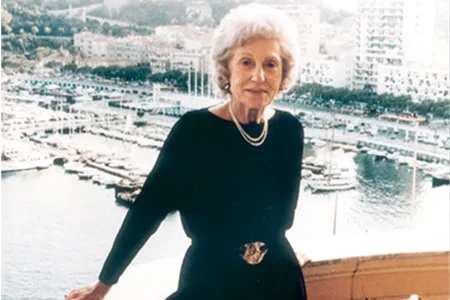Easton Family

The Mary S. Easton Center for Alzheimer's Research and Care at UCLA (UCLA Easton Center) is a comprehensive research center focused on Alzheimer's disease (AD) and other dementias. The Center is named in honor of the mother of Jim Easton, a UCLA benefactor and partner to the Center. Jim lost his mother to AD. The theme of the Center is the "therapeutic imperative," focusing on the overwhelming need for earlier (pre-dementia) diagnosis and new therapeutic agents that slow the course of Alzheimer's disease and other dementias. Included in this theme is basic science study of the basic brain processes involved in AD, animal models of AD, clinical research of biomarkers for these diseases, diagnostic research, and clinical trials of new medications. The UCLA Easton Center is one of the top in the nation and is supported by the National Institutes on Aging, the State of California and generous donors who share our commitment to developing new therapies for AD.

Finding a cure for Alzheimer's disease (AD) is the goal of the UCLA Easton Center and that goal is shared by our generous benefactor, Jim Easton. The UCLA Easton Center includes the state-funded education and outreach program for the underserved populations: the California Alzheimer's Disease Centers (CADC). Conducting state-of-the-art clinical trials sponsored by NIH, industry, foundation awards, and philanthropy. Our basic research programs are supported by grants from NIH, Veterans Administration, Alzheimer's Association, Alzheimer's Los Angeles/ BrightFocus Foundation, Paul Allen Foundation, Michael J Fox Foundation, California Alzheimer's Program, DOD, Air Force and others.
The UCLA Easton Center also includes the Jim Easton Consortium for Alzheimer's Drug Discovery and Biomarker Development, a separate research program funded by Mr. Easton. This Consortium supports the work of several investigators specifically to develop treatments for AD. The Consortium funds the work of biologists studying molecular protein folding, research to investigate the utility of new agents in animal models, and human research in AD patients. Mr. Easton has funded this Consortium personally, as a method to facilitate the type of high risk, high reward research that the leadership of the Easton Center believes will be instrumental and necessary for the development of an eventual cure for AD.
The goals of each division of the UCLA Easton Center align with the "therapeutic imperative" and each division exists under the general administration of the Easton Center's Director, Jason Hinman, MD, PhD. In this exciting time, we believe that every day brings us closer to new treatments for AD. The partnership provided by Mr. Easton and other supporters has become critical to accomplishing the goals of the "therapeutic imperative." Without these contributions, as well as the invaluable contributions made by our research participants, we could not continue to expand our knowledge of this disease. We believe that, together, our team is making a difference!